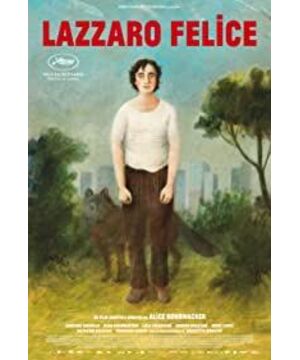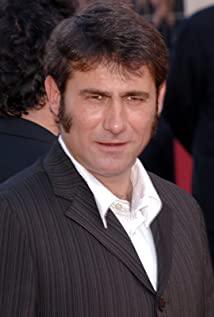one
summary of the story
The story begins in a small town far away in Italy. On a summer night, in a dark crowded room, everyone is arguing over a light bulb. The room is recreated by replacing the light bulb on the exposed wire, without the lampshade. It looks especially dazzling. The lover's song sounded outside the window, the boy showed his love to the girl in the family, the girl snuggled up to the boy, everyone gathered together in everyone's blessing, the boy announced the news that he wanted to go out, everyone talked about themselves view, repeating a name in the mixed voice - Azzaro (Lazzaro).
Azzaro, a boy with an angel-like face, pure and innocent. The deer-like eyes on his face, although only dull and smiling, are not dull. In his world, there is only work and helping others. Compared with the flexibility of normal people, Azaro's world has only one single line. Whenever and wherever, as long as he is called to help, he will do it without hesitation. No one told him why, nor did he pursue the value of doing it, and Azaro seemed both useful and transparent.
Azaro and his family lived in a feudal life, working at sunrise and at sunset, and regularly would have messengers from the Duchess in exchange for their main crop-tobacco, and as compensation they would get some life necessity. No matter how hard they work there is always work to do, only the debt to the Duchess and slavery remain the same, until Azaro's life is broken by the appearance of a boy.
He is a boy from the city, more precisely the son of the Duchess. He from the city of course knows that there is no slavery in this world. All this is a slavery lie made by his mother to deceive Azzaro and him. Free labor for the family. On the one hand, he despised his mother's actions, and on the other hand, he enjoyed all the advantages that life brought him. By chance, he met the kind Azzaro, perhaps Azaro's simplicity, or perhaps his servant attitude, and they soon became friends.
The young master in the city hated living in the countryside. Like every rebellious teenager, he chose to run away from home. However, the only place he ran away was to occupy Azaro's residence on the mountain. Even so, Azaro was still willing to insist on serving him. Deliver meals, listen to every command he issues, and treat the weapon he bestows—the slingshot—as a treasure. However, the young master's temper is always erratic, and his anger at Azzaro hurt him unintentionally. This vexatious remark made Azzaro seriously ill. However, the first thing Azzaro did when he said goodbye to his illness was to go to the hospital. Find his best friend, the young master.
The frivolity of youth brought the collapse of the slave lie. After the young master forged the lie of being kidnapped many times, the police began to search for him. The police were amazed that a group of such people still existed. The bubble completely burst. During the police search, Azzaro accidentally fell off a cliff because he had never seen a helicopter. Azzaro's family also came into contact with civilized society because of the arrival of the police and moved to the city. No one knew where Azaro went, and no one stayed because of his disappearance.
In the blink of an eye, 20 years have passed since the story. When Azaro was awakened by the wolf's call, the sea changed and it was Azaro who remained the same. When he returned to the house he used to live in, which was overgrown with weeds and cobwebs, he began a journey to find his family. The background of the story also went from a hot summer to a bitter winter.
Fortunately, Azzaro found his former family. Sadly, everyone was more afraid of his appearance and his unchanging appearance than happy. Perhaps their own life of scavenging could no longer integrate into a new person. Finally, through the retention of childhood friends and his contribution to everyone, he returned to this aging family.
The ingeniousness of life is that you never know what kind of people you will meet at what time. Azzaro, who found his family, also found the young master by coincidence, but the young master at this time was no longer a handsome boy with white temples. Despite his bloated body, he is still unruly. Azzaro was very happy to find the young master, and took him to see his family. Before leaving, the young master also made an appointment to visit his house the next day. Everything seems so beautiful, as if after the baptism of the years, everyone has already let go of the past.
The next day, the Azaro family brought expensive cakes to visit, but they were closed. The young master's wife said that life became so lonely because the bank cheated the young master of money. Simple Azaro found it because of this statement He went to the bank and claimed that he had brought a weapon. In the end, the customer of the bank found out that the weapon that Azzaro called was just a slingshot. The frightened crowd became resentful and attacked it. Azzaro died at the feet of the people.
At the end of the story, Azzaro saw the wolf that woke him up between life and death, and Azaro's life came to an end as the wolf gradually went away. In the final scene of the movie, the wolf runs on the road, all the cars are heading for the city, and only the wolf is heading for the countryside.
two
Narrative Features
The director of the film was born in a philosophy department. The beginning of the story will make people mistakenly think that it is about the exploitation of slavery. I didn’t expect that the whole film is going to be magical realism, and it has abandoned the ambiguity of time and space. The story is simple, and the 16cm film makes the picture rough and distant. The director's control of the characters and scenes, as well as the scenery from many aerial shots, have become another highlight in addition to the story itself.
Is Azaro happy? The director explores the weakness of human nature, the difference between urban and rural origin, the role of education, the lost path of politics, the blurring of religion, the conflict between tradition and modernity, the weakness and inaction of art, the source of stratification, and the homeland that cannot be returned. The director is not reiterating the law of the jungle, she is just asking us to participate in the discussion. In this magical and rough real world, human nature is mixed with divinity, servitude and animal nature. Can it survive all the current harsh winters, political and religious issues? Economic and moral winter. It is a sad and poetic philosophical image.
three
The details of the metaphor in the movie
It is worth mentioning that in addition to the complete storyline throughout the film, the description of the details of the characters has also become a highlight. As the saying goes, details depend on people, and the director's control of details enriches the level of the characters and helps the audience not feel bored during a long and peaceful viewing. At the same time, the detailed description also easily grasps the characteristics of the characters, helping the audience to quickly understand the characteristics and psychological conditions of the characters, and the strength is appropriate.
1. Grandma who can never let go
Grandma is an elder in the family. With a wrinkled face, her eyes disappeared when she smiled, her stooped figure was inconvenient to move, and she was always in a state of sitting still from appearance to disappearance. Azzaro is her carer and her wheelchair in the movie, and every time her grandma needs to move, Azaro holds her. Whether it is the family celebration at the beginning or the sunbathing in the middle, as long as someone shouts, "Azaro holds grandma upstairs." Docking with this little thing are two extended details. First, when Azaro was seriously ill, there was no place to live at home (the young master seized Azaro’s original residence.) The whole family was unwilling to sacrifice themselves to give Azaro a place to live, or grandma gave motherhood. of care. Second, when they returned to the city, the old people lived in an abandoned water tank. The water tank was very high off the ground, but grandma could walk up the stairs to the water tank by herself. This is undoubtedly a kind of irony. It is human laziness and kindness. rely.
2. Unfocused eyes
Throughout the movie, the protagonist's deer-like eyes give the impression that he is always looking behind your head. Nearly blue-green eyes are clean and transparent. When the movie gave the actor the first shot, he looked a little silly, so that it gave the illusion that the actor had an IQ problem. However, it is this look that makes this character come alive. When facing other people's requests for help, he never knows how to refuse - his eyes are dull; when he is sick, family members touch his forehead one by one to ask about the situation - his eyes are dull; , tossing oranges - eyes dull; being surrounded by people in the bank and beating - eyes dull. Perhaps it is this dull look that makes a selfless character, or the kinder people are, the duller they are.
3. About the appearance and metaphor of wolves
In our traditional memory, the wolf, as a cold animal, represents killing and cruelty. However, it is such an animal that acts as a simple, warm presence throughout the film. When playing with the young master, the communication with the wolf howling in the distance is simple and beautiful; Azaro fell off the cliff and woke up under the light smell of the wolf. The wolf smelled the special smell on him and couldn't bear to speak; at the end of the movie, the wolf Looking at Azaro and leaving, Azaro's soul left his body and turned into a wolf without knowing where to go. Like a wolf living in a crowd, he loves the world that has abandoned him, but he is an anomaly after all.
Four
Azaro's philosophy of life
1. How kind people digest sadness
In the whole movie, we can't see Azaro's emotional changes. In the saddest time (being questioned by the young master is not a real friend) Azaro chose to let himself go to digest. The so-called letting go is an independent station. In the rain, I can't hear the sounds around me, I can't feel the care of others, as if nothing else can affect me except my inner sadness. It's a bit rigid for this approach, but it's reasonable. Because his pure beauty can only bear the pressure of one thing, but the pressure itself has exceeded the emotional load, so his emotional system can no longer work. Sadness and happiness, as a set of antonyms, are two endpoints that coexist. In the movie, when sadness fills Azaro's soul, he can only choose to keep himself still, and apologize whether right or wrong after sobering up. Perhaps this is how good people deal with grief, and admit their mistakes after reflection. As a kind person, one thing that always follows is to think about the problem from the standpoint of the other person. If this person is important, then the problem is always yourself.
2. The relationship between kindness and loneliness
Azzaro's loneliness stems from the viewer who experiences the world. Through the movie, we see that Azzaro is a person who is needed by the collective. Whether it is the slave period of collective life or the scavenging period after going to the city, Azzaro is really useful. He is a good helper in the life of slavery, he accepts all the work, likes to help others, is willing to share and sacrifice himself; he is also a living dictionary of scavenging life, he knows where to find potatoes, and where the wild carrots do not grow , he helped his family live better. However, his family chose to abandon him when they left the village, and chose to abandon him again when he returned to the city. Because he is a useful person but not their family, he is the carbon in the snow but not the flower on the scene. This is the loneliness that all audiences can see, but Azzaro chooses to forgive. For these experiences that seem ruthless and indifferent to us, Azaro chooses to not care. Perhaps the relationship between kindness and loneliness is that you have to bear your own responsibility. Lonely, but also bear the loneliness of others.
3. The original intention of happiness
There are three loves in the world: family, friendship, and love. In Azaro's world, the feelings that the audience sees are more pure. If Azaro treats the family as a family, then the feelings towards the young master can be attributed to friendship or even love. In emotions, how to position ourselves is particularly important. We are gradually becoming selfish in urban life. Whether it is given by the family or external pressure, people's emotions are gradually ignored. I wish I could be in control of my emotions. We are afraid of being hurt, so we don’t want to give; we want the other person to be nice to us, but we just want to enjoy. In Azzaro's world, the worst of people can also have a bright spot. He is willing to help others and is more willing to sacrifice his own interests in front of problems. He would brew coffee because the young master said he likes to drink coffee when he smokes, and he would secretly steal canned food for the young master. As a paying person, I feel that all the sacrifices are worth it, and that is the greatest happiness.
In the movie, Azaro is the simplest existence, and it is this simple existence that turns all superfluous emotions into a burden when he is attached to him. Pure beauty exists only in pure life, director Alice Lorwacher said in an interview: "I don't think there is individual happiness in this film, the characters in the story are pursuing a collective happiness, but this Impossible. I don't think Azzaro is happy either, he didn't ask for more, but when he had the desire, it didn't turn out as he wanted. Lazaro's happiness is not the solution to it all, he's just pure proof of existence."
View more about Happy as Lazzaro reviews











